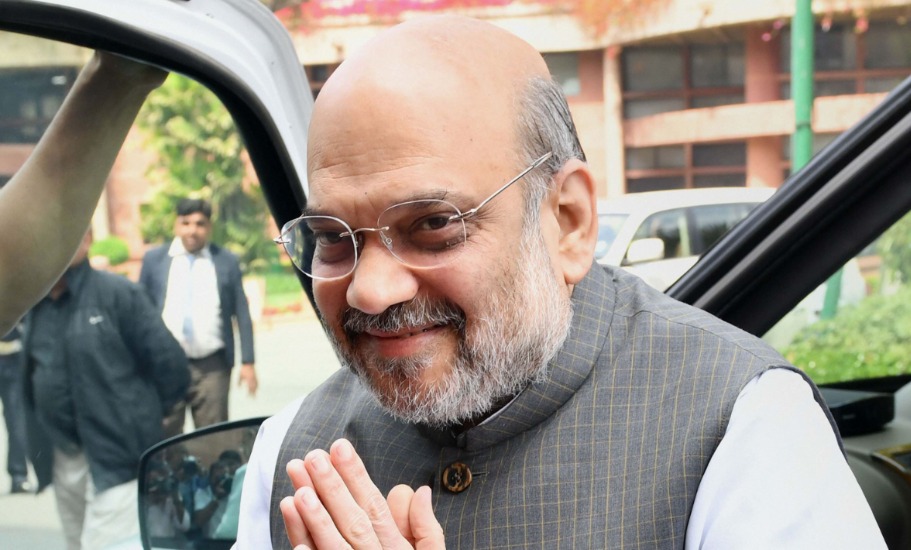
Shah embarks on Bengal lunch politics, Trinamool tries to change the course

Hours before Amit Shah had lunch at a tribal home in West Bengal on Thursday (November 5), the Mamata Banerjee government-appointed Gita Mahali as a home guard attached to Naxalbari police station in Darjeeling district. The move stunned the BJP.
Incidentally, Mahali had hosted Amit Shah for lunch at her residence in April 2017, when BJP was trying to win favour with tribal communities.
Talking to reporters, Mahali said, the BJP never enquired after her family after Shah’s lunch at her house. She said that her family, however, got assistance from the state government, under the Gitanjali Housing Scheme, to build a house. “BJP always does politics over tribals and the marginalised. But our leader, Mamata Banerjee, always looks after her people and so she appointed Gita Mahali as home guard today,” said Darjeeling district president Ranjan Sarkar.
In response, BJP leader Praveen Agarwal said, “If the state government gives jobs to those at whose house our leaders have lunch, then we will ask them to have lunch at every house so that everyone gets employment.”
Amit Shah, who is on a two-day trip to West Bengal to galvanise BJP workers, is trying to use ‘luncheon politics’ to consolidate the support of tribals and Matuas, the two communities that backed the BJP in the last Lok Sabha elections.
Shah started his programme by garlanding the statue of Adivasi icon Birsa Munda. After a meeting with BJP party workers from tribal-dominated Jangalmahal and neighbouring areas of the state’s southern region, which accounts for 70 Assembly seats, Shah drove to Chaturthi village, about 10 kilometres from Bankura Town, to have lunch at the residence of Bibhishan Hansda, a tribal worker of the party.
On the second day of his tour, on Friday (November 6), Shah will eat lunch at the home of Nabin Biswas, a Bangladeshi refugee family from the Matua community near Kolkata
The BJP’s selection of the communities for Shah’s luncheons is significant as there are reports that the TMC has, of late, has managed to win back the support of the two communities that had propelled the BJP’s surge in the state in the 2019 parliamentary elections.
According to the 2011 census, the tribal population in Bengal is 52.96 lakh, or about 5.80 per cent of the total population. The majority of the tribals are settled in Jangalmahal area spread across Bankura, Purulia, Jhargram, Birbhum, and West Midnapore. Jangalmahal has 44 Assembly seats.
Matuas, an influential Scheduled Caste community that comprises 23 per cent of the state population, are a decisive factor in at least 74 of the state’s 294 Assembly seats.
To counter the BJP’s outreach drive among the communities, chief minister Mamata Banerjee has tried to woo tribal communities with a slew of sops, including freehold land rights to refugees from Bangladesh.
The state government, on Tuesday (November 3), granted land rights to 25,000 refugee families from the Matua community, announcing that a total of 1.25 lakh families living in refugee colonies will get the land documents without any condition. “This land right document will be a proof of your Indian citizenship. No one can take away your citizenship,” Banerjee said announcing the scheme in an attempt to counter the BJP’s CAA-driven campaign among the refugees. She also announced setting up of development and cultural boards for Bauri/Dhule, Bagdis and Majhis, the three Scheduled Tribe communities, so that they could preserve their cultural heritage.
Matuas are particularly unhappy with the BJP for its flip-flop on their citizenship status. “First, the party created insecurity among the community by announcing that a nationwide National Register of Citizens (NRC) will be created to drive out all Bangladeshi immigrants. Then it tried to assuage our concern by enacting Citizenship Amendment Act (CAA), which has not yet been implemented,” said Santosh Kamailya, a Matua voter from Gaighata Assembly constituency.
On the second day of his tour, on Friday (November 6), Shah will eat lunch at the home of Nabin Biswas, who is from a Bangladeshi refugee family from the Matua community near Kolkata. “When Amitji will come to my house, I will thank him for the CAA and will request him to implement it in Bengal as soon as possible,” Biswas said.

